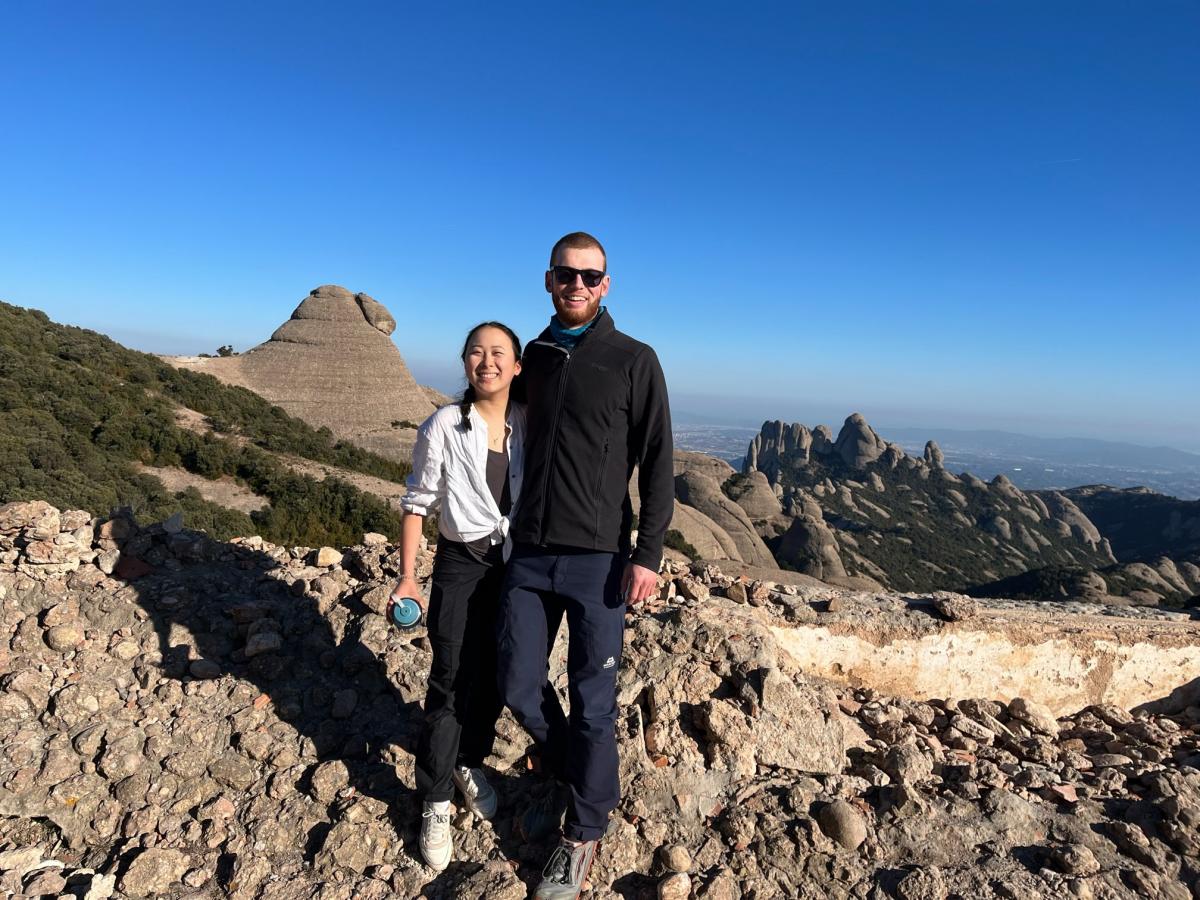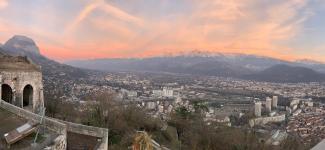Are you a UBC undergrad thinking about going on a student exchange? It can be a daunting decision. You might wonder, what's it like spending a year or a semester in another country? How can you prepare? And how do you handle it when things go sideways? We talked with a group of UBC Global Ambassadors who studied abroad with a Go Global program. They spoke with us candidly, sharing their personal impressions, fears and misgivings, best memories, top tips and advice. (This is story #4 in a series of five Global Exchange Insider interviews.)
Meet Sasha Soda, from Richmond, BC. She is a 4th-year UBC undergraduate in the Faculty of Land and Food Systems’ Global Resource Systems.
Before you go
Why did you pick Université Grenoble Alpes? How did you hear about it?
The mountains and outdoor activities nearby. It’s near Switzerland, but not as pricey, in a French-speaking area (I learned a bit in high school), but not as large as Paris. Grenoble is a large, international student town.
I kind of just chose it randomly. This university was actually not one of my top three choices. I decided I didn’t want any of the schools I had chosen previously any longer and asked my Go Global advisor about potential places that were still available. I wanted somewhere in Europe near the mountains that wasn’t too costly to live in and this is the university that came up.

UBC student Sasha Soda (left) took a detour on a road trip to Barcelona to hike up Monsserat with a friend (photo: Sasha Soda)
What was the application process like? Any tips?
Not hard. The hardest part is just getting yourself to fill out the application and submit it at the right time. I missed the first deadline and had to fill out the second one in Term 2. My advice is: Get your applications in on time!
How did you prepare? Anything to be aware of? (travel, cultural differences, classes, etc.)
I didn’t research too much about the place until three days before and found out Grenoble was known to be a sketchy area of France. I got spooked a bit, but when I got there it was fine. I have found most places in Europe, with a few exceptions, are less safe than Vancouver. But it is still safe; you just have to be more aware of what you are doing and your surroundings. My recommendations are:
- Learn basic vocabulary of the places you visit and have Google Maps downloaded with the area where you will be travelling in case there is no WiFi.
- People tend to be nice. If you’re lost or need help, don’t hesitate to ask for assistance from strangers—but listen to your gut, use your best judgment and choose people to talk to with care.
- Get your Visa early! Mine took a while.
- Getting paperwork done was tough because the person helping me in France was very uncooperative and unhelpful. Always ask Go Global advisors for help if you are in that situation: they are knowledgeable and helpful.
- I recommend arriving at the very least a week early before your exchange to get settled and accustomed to the environment. Universities tend to have welcome events before classes begin, too, but I could not attend because I arrived quite late.
What worries did you have beforehand? How did you overcome the anxiety?
Seeing as my exchange was the longest I had ever spent away from home, I worried I would be overcome with homesickness that would hinder my experience. Taking plenty of time to mentally prepare for my exchange helped calm my nerves. I got excited for all the opportunities to come, so I could approach the exchange with hopeful anticipation rather than crippling anxiety. Of course, there were moments throughout the year when I missed home. But regular communication with family and friends helped me feel connected to them despite the time zone and distance between us.
It’s important to remember that though you might miss elements of home, your exchange doesn’t last forever. So make the most of the experience by being present and fully immersing yourself in your environment—because time passes you by faster than you realize. Seriously, a school year never felt so short!
My other concern was being able to feel at home in my new environment. I overcame this by identifying what makes me feel the most comfortable and content. For me, it’s the people in my life. So the advice I’d give is to get out of your comfort zone. Put yourself in situations where you can meet and really get to know new people: whether that’s through orientation events, club meetings, classes or even your own roommates (I got very lucky there). No doubt you, too, will find people who make you feel at home no matter where you are.
Specific worries I had were:
- Will I get my Visa on time? I applied for my Visa late because it was tough getting all the documents together due to the exchange schools’ administrative staff delays and also I only applied for the Visa a month before departure. In the end, my Visa arrived a week before departure.
- Will the people be nice? When I was trying to figure out school documents and applications, the lady helping me in France was very slow in replying. She was unfriendly and hard to work with. This gave me a skewed impression that maybe I chose the wrong place to go on exchange to. I realized that most French administration stuff is hard to work out. I also had a mindset that most are genuinely good-willed people (that’s not the case).
- Was it safe? I realized the exchange location was known to be a sketchy city three days before departure, so I was worried about safety. It was too late to back out, but I thought it shouldn’t be too bad since France is a developed nation.
- Will I have all the proper living amenities when I arrive? The university staff told me one day before I left that they were out of the portable stoves, utensils and bedding supplies they had promised. I was only planning to bring one bag for the six-month exchange, but found out I could bring another suitcase the day before departure and filled it with a sleeping bag, pan, bedding and utensils.

Sasha Soda biked 60 km round trip to Lausanne. At Chillion Castle, she used a friend's bike to avoid train costs while taking in great views of the winery, though the surrounding mountains were socked in with clouds (photo: Sasha Soda)
During the experience
How was the overall experience? What did you learn?
Amazing. I met lots of new friends and experienced living on my own while learning to navigate foreign places. I enjoyed getting lost and finding my way back to where I needed to go. I found lovely places to explore as well. Being in a city that only spoke French was difficult as a non-French speaker, but I learned a lot being a foreigner in a small French town. I also enjoyed the city layout and how incredibly walkable everything was.
My tips are:
- Go to thrift stores for necessities when arriving or check out second-hand online selling platforms.
- Save your food jars and cardboard for cheap organization and cups.
- Research different modes of transportation for travelling and which areas are safe.
- Always keep track of your valuables and backpack to guard against pickpockets in larger cities.
Make the most of the experience by being present and fully immersing yourself in your environment because time passes you by faster than you realize. Seriously, a school year never felt so short!”
If you could change something or do it differently, what would you change or do?
Not much, honestly. I would’ve gone backpacking in a hut near the area I was staying if I had had more time. I recommend eating out at least once a month: Don’t be too stingy because you can’t really try this type of food in Canada.
How were the academics?
Much easier than UBC. I had a mandatory French culture class, which was really fun, and even got a wine-tasting lesson in that class.
How was the social aspect?
Great. I met a lot of people in the first welcome week, then through mutual friends afterwards or through class. I also met others who were interested in travelling and people who had friends in different locations. A typical day was going to school or ski class, then doing something social afterwards. Highlights include:
- Getting together at friends’ places or going to the bar
- Hiking the Bastille, the mountain right outside the town
- Swimming in a nearby lake
- Biking along the river, castle or up a mountain nearby
- Exploring a new part of town
- Travelling with friends to different areas in Europe
- Joining University Grenoble Alpes rock climbing week-long camping trip and multi-pitching in the Calanques National Park
- Backcountry skiing in La Grave and getting avalanche safety training in a school mountaineering ski class, taught all in French. I met some cool people who helped translate everything the teacher was saying for me (ski class was 25 Euros, which included five classes and a ski pass for the class)
- Seeing my friends in Denmark in Term 2 after meeting them in the first term at UBC when they were on exchange in Vancouver
- Exploring the Chartreus Monastery
After the experience
Would you recommend this experience to others? What can they look forward to?
Yes. Grenoble is quite a bit more affordable than larger cities and surrounded by nature. It’s a very green city with accessible and affordable public transportation, bikes and bike routes since the mayor is a supporter of public transit. You can expect to meet different people and try new food, while experiencing a different culture with different social norms. For example: North Americans ask lots of questions and talk a lot when meeting a new person. Europeans tend to be more reserved. I realized this and adjusted how I speak when meeting people. Also, in North America we stand quite far apart in lines at groceries. In Grenoble, people were very close when lining up, which felt uncomfortable and took a while to get used to.
What was the impact on your academic and personal development?
I have a greater understanding of what it is like to be a newcomer to Canada with a language barrier and having grown up with cultural differences. I started biking to places and using public transportation more after coming home. I have a greater appreciation of how safe Vancouver feels, along with cheaper gas prices, less population and pollution. In the end, I realized there is no one perfect place to live; there are pros and cons to everything, and you have to decide what is best depending on your lifestyle and personal preferences.
Read more Go Global student stories.
